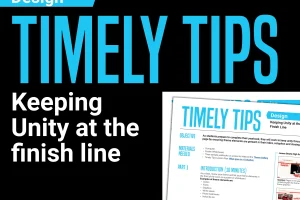
Systems of Success – First Deadline Considerations
Updated on Nov. 24, 2020
It may be just a few weeks later than usual but that first deadline time is here! It certainly hasn’t been easy, but you’ve got this.
Even in COVID times the year always sets up as:
- Part One – Training and team building
- Part Two – Finalizing your theme, ladder and look
- Part Three – Putting all that together to start producing pages and meeting deadlines
Our first deadlines, including cover and endsheets, were always in late October/early November. Many of you may have bought yourselves a little more time by making your book either summer or fall delivery, but that first deadline is still just around the corner.
 Meeting the first deadline and sending in that first set of pages was always the best and most difficult part of the year for me and my staff. Before you send anything into the plant, you have infinite possibilities and thousands of decisions and choices must be made.
Meeting the first deadline and sending in that first set of pages was always the best and most difficult part of the year for me and my staff. Before you send anything into the plant, you have infinite possibilities and thousands of decisions and choices must be made.
After you have completed that first set of pages, you may have limited some of those possibilities, but your book has begun to take shape and develop its unique character and voice for this unique year.
It’s exciting and just a little bit scary!
Whether you have already sent in your cover and your first set of pages or you are almost ready to, this is the time when we all start scrambling.
Consider these questions to help you have a most successful first deadline and all those that will follow.
Does everyone on staff know what their tasks are and exactly when they are due?
Each staff member must understand exactly what is expected of them and when the work is due. This is a great reason to have one or more managing editors who will monitor all parts of the production process and the mini deadlines along the way.
Use your teaching platform – Zoom, Canvas, Google Meet, Microsoft Teams – to connect with your staff and coach them regularly both individually and in groups or teams.
Does everyone on staff (including the editors) know what high quality work looks like?
Be sure to provide staffers with models of quality work. Just getting it done is never enough. What does a solid 300-word story look like? How does it read? What are the types of photos that will and will not go into the book? Don’t just tell them; show them with great models. The whole staff also will need to work together with your entire school community to get the photos you will need.
Have you trained your staff to do the work you have assigned them?
It’s so easy to assign work, but is every staff member prepared to do it well? Have you provided them a clear timeline and set of mini deadlines from start to completion? The greatest tension often came from last minute work demanded by the editors that the staffer did not understand how to do. Every bit of work necessary to produce a quality yearbook is part of a process that can be broken down into parts and steps which can be trained.
Are you coaching them at every step in the process?
Is coaching an ongoing part of your production process? One successful program in Florida utilizes four managing editors who each are in charge of 6-8 staff members. During every class period they are checking with their team and are helping them understand what they have been assigned, checking progress along the way and helping them achieve their highest level of quality work.
Have you given the staff enough time to produce quality work?
Avoid dumping last minute work on staff members who are already working hard. Just because YOU have not planned well, it should not make it OK to expect them to crank something out on short notice. Great editors plan to ensure everyone knows what they are doing, have been trained to do it and are coached to success from start to finish.
Have you built in time to debrief how it went when deadline has been met?
Once that first deadline is behind you, take time with your editors and staff to debrief what went well and how you can improve how you will perform on your next deadline. Other media staffs are better at this than we yearbookers are. Capture what you did well and learn from your mistakes and each deadline will be easier to meet.



